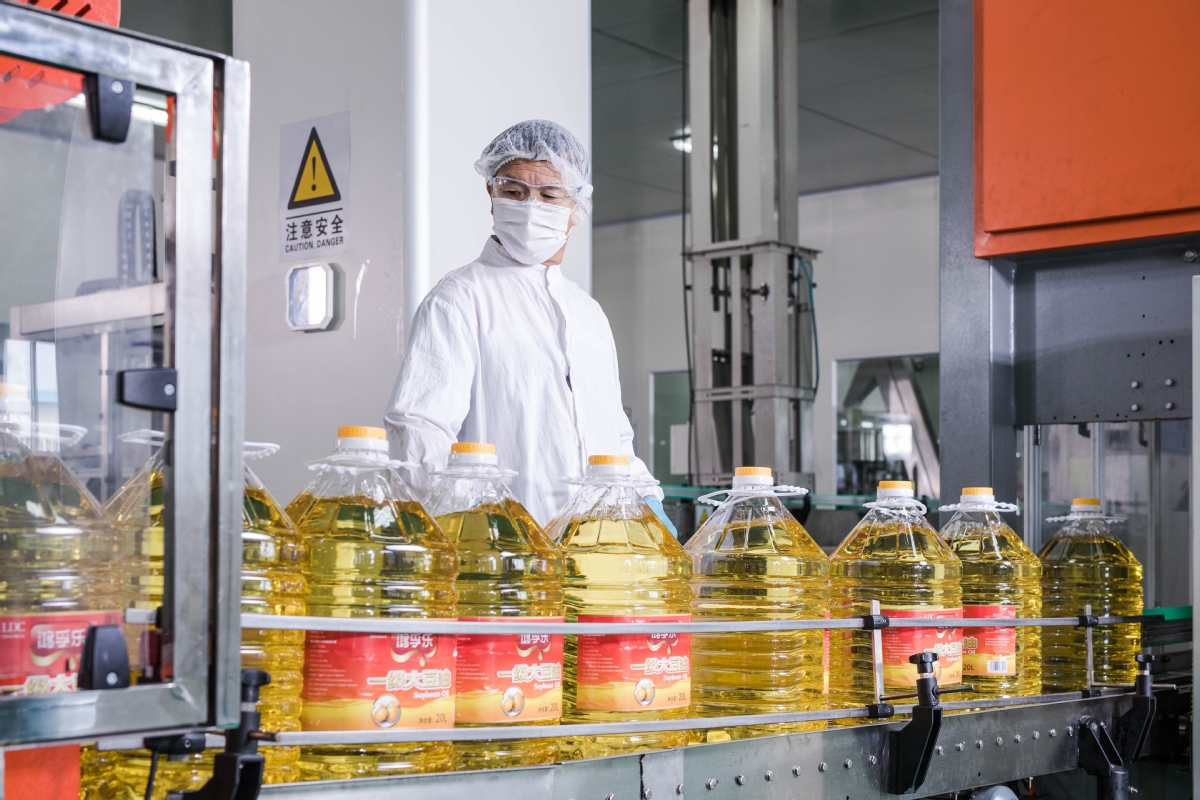
An employee checks products at an oilseed crushing factory of Louis Dreyfus Company in Zhangjiagang, Jiangsu province. [CHINA DAILY]
Louis Dreyfus Company (LDC), the Netherlands-based processor and merchant of agricultural goods, will launch a new specialty feed production line in Tianjin in the second half of 2025 and expand its oilseed crushing capacity in China, said its top executive.
This new line will focus on producing fermented soybean meal as a feed ingredient that can help to improve the health status and growth rate of several animal species, and contribute to more efficient livestock farming, said Michael Gelchie, CEO of LDC.
"To support our core merchandising activities, we are making important investments to enhance our oilseed crushing capacity in East China's Jiangsu and South China's Guangdong provinces. Through our newly established research and development center in Shanghai, we will continue to develop various food, feed and ingredient products for both the Chinese and global markets," Gelchie said.
LDC, also a seven-time participant in the China International Import Expo, will showcase its latest cooking oil, juice and coffee products at the grand event in Shanghai next month.
Along with Archer-Daniels-Midland Co, Bunge Global SA and Cargill Inc from the United States, LDC is one of the four "ABCD" groups that are highly influential in global agricultural commodity trading.
As China continues to play a key role in global trade, its vast market drives opportunities by stimulating domestic demand and fueling market growth. This also boosts imports of quality products and services, including high-quality protein sources — a sector in which LDC is actively involved, he added.
According to its 2023 annual financial report, LDC's net sales in the Chinese market reached $12.6 billion, representing 25 percent of its total global net sales. The group currently employs 18,000 people and operates in more than 100 countries and regions.
In addition to importing agricultural commodities into China, LDC operates several oilseed crushing plants in Tianjin, the Yangtze River Delta and the Pearl River Delta regions, as well as a joint venture in Tianjin that provides feed products to North China.
Despite heightened geopolitical tensions this year, which have added uncertainty to the global economy and impacted agricultural commodity markets — compounding issues like port congestion and climate challenges — Gelchie confirmed the group's commitment to its growth plans in China and globally, as it continues to invest in its core operations to support global access to food and agricultural products.
He stressed that open global food trade and international cooperation are essential to strengthening partnerships and fostering open dialogue across food supply chains, helping to address challenges and ensure food access for all countries and regions.
In 2023, China imported 160 million metric tons of grain, an increase of 11.7 percent year-on-year. In terms of composition, soybeans still accounted for the majority, representing over 60 percent of the country's total grain imports, said the Ministry of Agriculture and Rural Affairs.
Importing agricultural products helps China manage market volatility, ensuring domestic food price stability amid global climatic and geopolitical shifts. This measure helps mitigate risks that could disrupt local markets or lead to food scarcity, said Li Guoxiang, a researcher at the rural development institute of the Chinese Academy of Social Sciences in Beijing.
To meet the diverse consumption demand within the domestic market, China saw its imports of coffee and tea jump 24.6 percent year-on-year to 19.56 billion yuan ($2.75 billion) in the first quarter of this year, while imports of honey, sugar and sugar products grew 27.2 percent on a yearly basis to 22 billion yuan, said the General Administration of Customs.